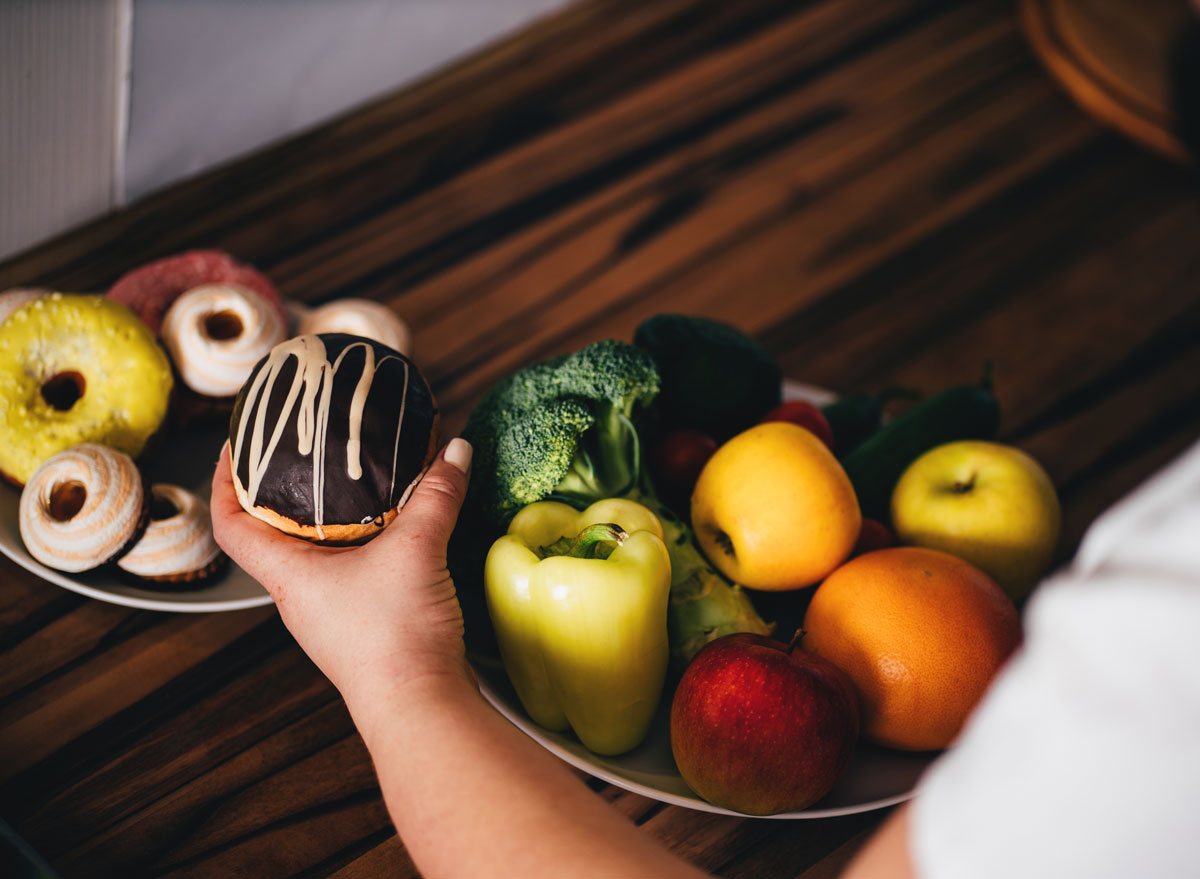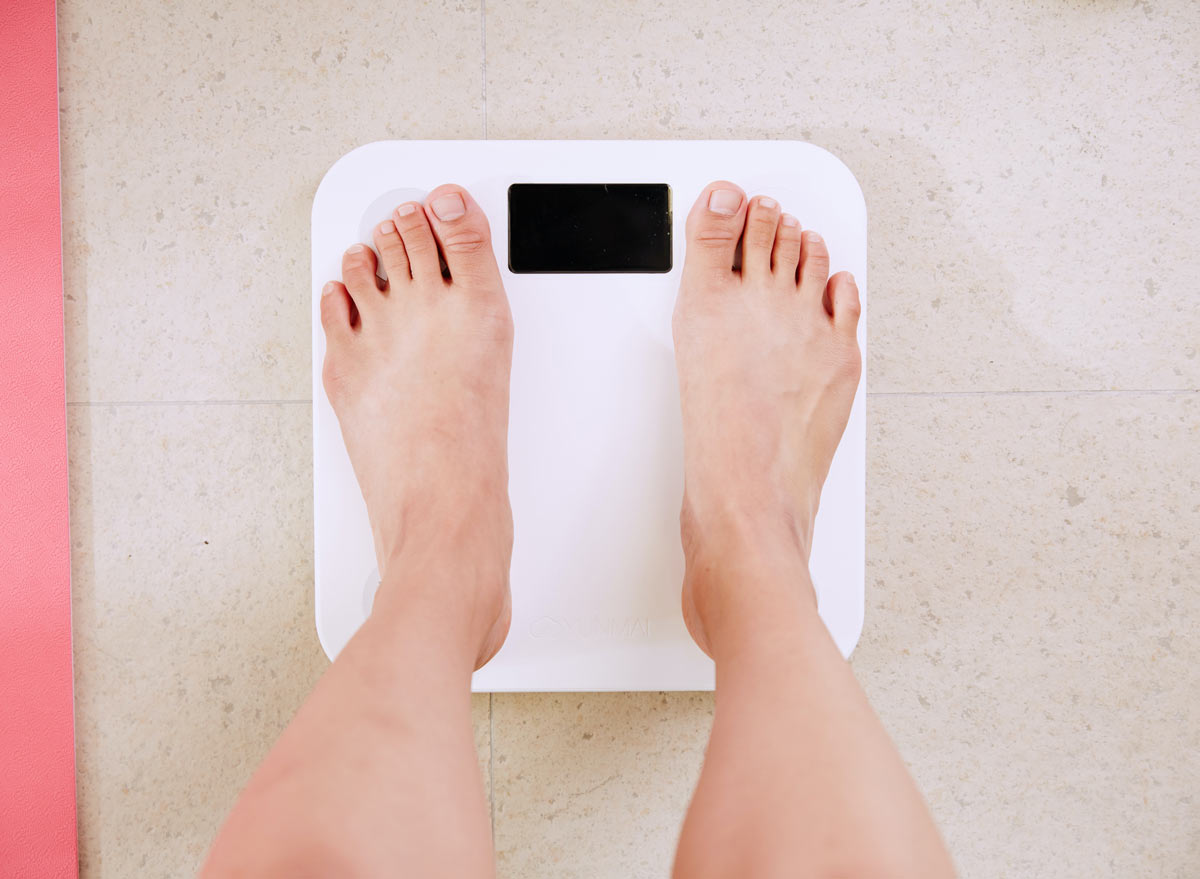9 Warning Signs You’re Not Eating Enough Vegetables

Vegetables have an undeserved reputation for being bland, lacking flavor, or tasting bitter. (But that’s just because you aren’t cooking them properly.) While you may have been forced to get them down as a kid, as an adult you may still struggle to include veggies in your diet. The problem is that these superfoods are packed with everything your body needs to stay healthy, and not eating enough can have some serious consequences.
“Vegetables have so many benefits like being rich in vitamins, minerals, antioxidants, and fiber,” says Maggie Michalczyk, RDN, registered dietitian nutritionist and owner of Once Upon a Pumpkin.
Your body uses all of these things to function properly and prevent chronic diseases. Best of all? You really don’t even need to eat that many veggies to reap these benefits. According to the USDA, the amount of veggies each person needs can vary between 2 and 3 cups each day. For women, that amount is between 2-2.5 cups, and for men, it is 2.5-3 cups.
While that may sound like a manageable amount of food, that doesn’t mean it’s an easy goal to reach. Only 1 in 10 adults meet the federal fruit or vegetable recommendations, according to a new study published today in the CDC’s Morbidity and Mortality Weekly Report (MMWR).
Another reason veggies are an essential part of your diet? They’re among the best fiber-rich foods. “Eating a variety of vegetables not only provides antioxidants, but it also provides fiber. Fiber helps support healthy digestion and helps people feel more satisfied after eating their meals,” says Yasi Ansari, MS, RDN, CSSD, a registered dietitian nutritionist and spokesperson for the Academy of Nutrition and Dietetics.
And—no surprise here—most Americans are falling short of daily recommended fiber goals as well. Men should aim to consume 38 grams and women should aim for at least 25 grams of fiber per day, according to the Academy of Nutrition and Dietetics.
Not eating enough veggies can have many negative effects on your body and health. Here are 9 signs you may not be eating enough veggies. If these don’t encourage you to make a change to your eating habits, then maybe these 21 Warning Signs You Need to Change Your Diet—Fast will.
Your mood is low.

“Vegetables are an important source of numerous vitamins and minerals that are necessary for our body’s critical functions. If you aren’t eating enough vegetables and the primary source of energy in your diet is from high fat, high carb, or highly processed foods then you are likely getting a burst of energy followed by a crash after most meals. This can result in fatigue, memory loss, and changes in your mood,” says Michalczyk. “Swapping these high-fat foods for more nutrient-dense foods like vegetables will prevent you from feeling that crash. It will also give you sustained energy for a longer period of time. Similarly, the vitamins and minerals found in vegetables can play an important role in your mood regulation. Some studies suggest that there is a relationship between diet and mood and diets low in fruits and vegetables are associated with higher risk for depression.” If you want to lower stress, consider adding these 32 Foods That Turn Off the Stress Hormone That’s Making You Fat to your grocery list.
You’re not satisfied after meals and feel hungry soon after eating.

“Adequate fiber from veggies helps to increase satiety (helps keep you full longer because it takes longer to digest) and also helps sustain energy,” says Ansari. “By not eating enough vegetables, you may be craving another meal or snack shortly after the food that you just consumed.”
STAY INFORMED: Sign up for our newsletter to get the latest food news delivered straight to your inbox.
Your skin is looking dull.

“Vegetables are packed with antioxidants that may help prevent our body from free radicals that may damage our skin texture,” says Keri Gans, MS, RDN, CDN, registered dietitian nutritionist and author of The Small Change Diet. “Also, many veggies are packed with water, think tomatoes, and can be hydrating for the skin.”
You’re prone to muscle cramps.

“Muscles need enough potassium for smooth muscle contraction. So, muscle cramps and twitches can occur if your blood levels of potassium are too low,” says Charlotte Martin, MS, RDN, CSOWM, CPT, registered dietitian nutritionist and owner of Shaped by Charlotte. “Fruits and veggies are the best sources of potassium, so it’s important to get enough produce in the diet. The best vegetable sources of potassium include dark leafy greens, like spinach and swiss chard, and sweet potatoes.”
You have irregular bowel movements or constipation.

“Adequate dietary fiber from vegetables helps to add more bulk to waste and helps to move waste more quickly through the intestines. Just make sure to drink enough water while you increase your daily fiber intake,” says Ansari.
You’re stressed a lot.

“Magnesium also helps promote relaxation by maintaining healthy levels of GABA, a neurotransmitter that calms the body and mind. It also plays a role in the body’s stress response system, and deficiency is associated with higher stress and anxiety,” says Martin. “The relationship between magnesium and stress is a two-way street: stress causes magnesium depletion and magnesium deficiency amplifies stress. Veggies, especially dark leafy greens like spinach, are one of the best sources of magnesium. So, not getting enough veggies in your diet could certainly cause low blood levels of this mineral.”
You’re feeling fatigued

“One reason [you’re feeling fatigued] can be as a result of consuming too many highly processed foods (for example foods high in simple sugars and sodium). Consuming highly processed foods can put extra work on the body and cause drained energy, not to mention foods high in simple sugars may cause spikes and drops in energy levels,” says Ansari. “When you’re feeling fatigued, aim to add your veggies at meals!” Ditch those processed foods, and you’ll notice 21 Things That Happen to Your Body When You Stop Eating Processed Food.
Your vision is impaired.

“That old saying about carrots being good for your eyes actually has some truth to it. Carrots are rich in vitamin A, and if you don’t get enough of it in your diet, your vision can be impaired and it may manifest itself as night blindness or worse,” says Michalczyk. “Vitamin A deficiency can also cause dryness of the eyes, corneal ulcers, and retinal damage, which is what causes blindness. Vitamin A is found in yellow and orange-hued vegetables as well as dark leafy greens, so making sure you get enough of these veggies in your diet is crucial when it comes to protecting your peepers.”
You’re gaining weight or having trouble losing weight.

“Vegetables can provide a lot of volume for little calories. They’re also an excellent source of fiber, which helps fill you up without filling you out,” says Martin. “It’s common knowledge among health experts that a diet rich in produce, especially non-starchy vegetables, is essential for those who want to lose or maintain weight. Individuals who don’t eat many veggies are likely displacing those veggies with higher fat and/or sugar foods, which are higher in calories and therefore can make it difficult for them to lose weight.” That isn’t the only thing that’s keeping your body from shedding pounds. There are also these 30 Hidden Reasons Why You Can’t Lose Weight.
How to eat more vegetables

If you didn’t know, research has found that fresh and frozen veggies are equally healthy, so either of those options are worthwhile solutions to eating more vegetables. For more ways to fit vegetables into your diet, Ansari has a few tips:
Breakfast: Add veggies to your morning omelet or egg sandwich. You can also add veggies like spinach to your breakfast smoothie.
Lunch: Add more veggies to your turkey or hummus wrap or pair a sandwich with a side of veggies and your favorite dip.
Dinner: Focus on making 1⁄2 of your plate filled with color! “I love roasting veggies or putting together a leafy green salad and adding fruit to it.”
If you can’t follow these tips, then you need to know what will happen next: What Happens to Your Body When You Don’t Eat Fruits & Veggies.